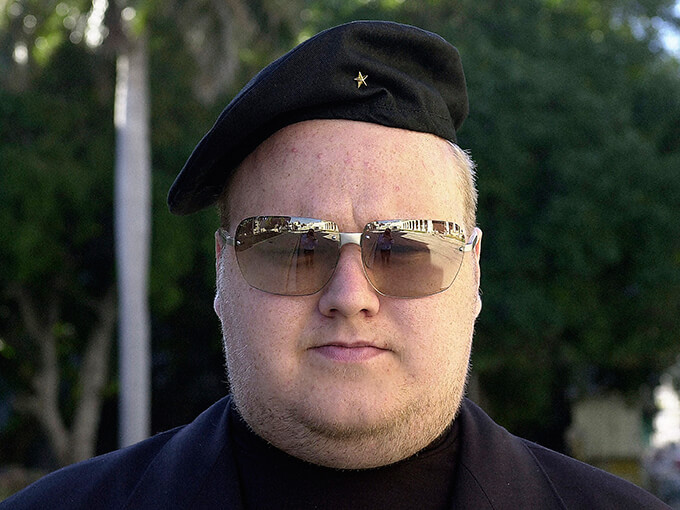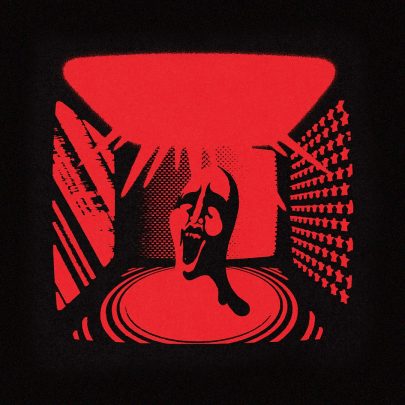Jul 29, 2017 Film & TV
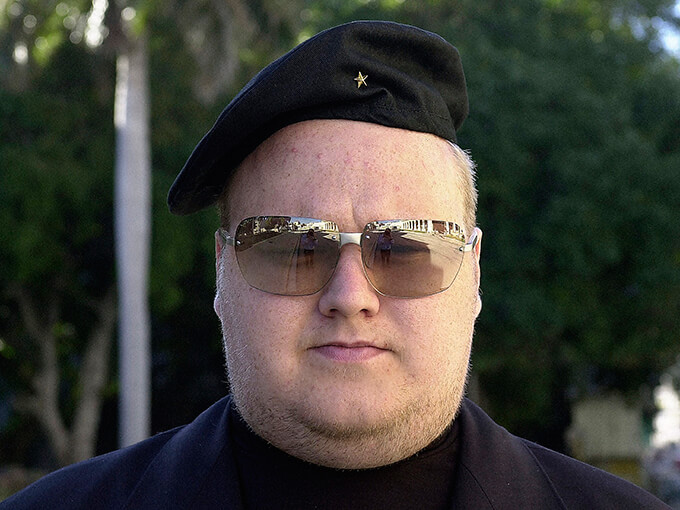
Ballad of a big man
Annie Goldson’s new film about Kim Dotcom raises issues over copyright, extradition, privacy, surveillance and much more. The veteran documentary-maker tells Metro about her approach to the job.
When we meet in her bunker-like office with its mean, ill-positioned windows on the fifth floor of the somewhat Stalinist Human Sciences building at the University of Auckland, there’s not much sign that the media and communication department professor is such a highly decorated film-maker. Her films have won more than 50 awards at international film festivals. In 2007, she was gonged — officer of the New Zealand Order of Merit — for services to film. She’s a fellow of the Royal Society of New Zealand and has won several research excellence awards. As always, there’s new work on the go — a film collaboration about the women’s march which is currently crowd-sourcing interviews from participants worldwide. On a completely different tack there’s The Imperial Throne: the Millionaire, the Prince and the Disappearing Islands, about Russian oligarch Anton Bakov’s mad plan to set up the Romanov empire in Kiribati.
For now, we’re talking Caught in the Web, due to show here at the New Zealand International Film Festival in July-August and to be released by Gravitas Ventures in the United States and, ideally, simultaneously internationally on August 22.
Obviously, the documentary could have been made without Dotcom’s co-operation. The larger-than-life delinquent digital native has blazed a broad trail of his life and times on the internet for all to see. But getting access to it for a documentary was always going to be problematic, ironically because of copyright.
Most of the more flamboyant stuff — the luxury lifestyle, the parties, the yachts, the exotic locations, the fast cars and the bikini women — was shot or commissioned by Dotcom. When he arrived in New Zealand with wife Mona and the kids to start a new life, a private videographer always seemed to be in tow, especially once the trouble started. One way or another, Kim Schmitz, born in 1974 in Kiel, Germany, was going to bask in fame or infamy; he didn’t seem to care which. Schmitz was never a name to remember. At 18, he preferred Kimble, his hacker moniker styled after Dr Richard Kimble of The Fugitive; then Kim Tim Jim Vestor; the Kimster; His Royal Highness King Kimble the First, Ruler of the Kimpire; finally settling upon the comical Kim Dotcom, his legal name since 2005. Sometimes he was Megaracer, under which he became the No 1 player worldwide in Call of Duty Modern Warfare 3. The New Zealand police and our Government Communications Security Bureau spy agency dubbed him Billy Big Steps as they spied on him and prepared to raid his Dotcom Mansion on January 20, 2012.
With so much of the footage in Dotcom’s control, how to get it? More importantly, how to tell, and be seen to tell, the story independently? “My concern was that a film on Kim, like films on many controversial internet personalities, risks being a hagiography or a hatchet job,” says Goldson. “I didn’t want to do either.”
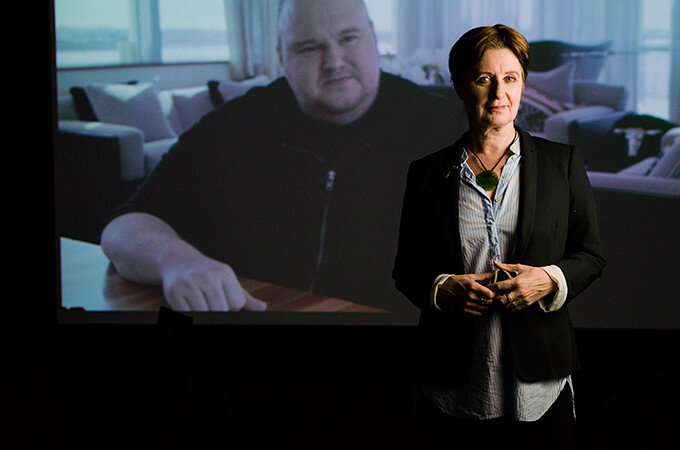
Like many New Zealanders, she became aware of Dotcom and his mega-personality after the raid. “It was a shock and surprise. Not many of us knew Dotcom was living here, that he was associated with Megaupload — or even what Megaupload was.” It was the militarisation of the raid that bothered her most. “I’m someone who feels there ought to be other solutions rather than using live ammunition, flak jackets, helicopters and attack dogs,” she says. “I’m not a total peacenik — sometimes a show of force is necessary. But in this instance, basically a fraud case, a ‘white collar’ crime, I felt our government and police force went way overboard and were too willing to act on behalf of the United States. The raid was conducted for its ‘optics’, to use a fancy term.”
Other things disturbed her, too. The media had been kept in the loop. “Apparently, the police were sending out press releases as the raid happened, letting journalists know the address and filling them in on the backstory. That smacked of contrivance to me and, by the looks of it, the media both nationally and overseas seemed largely to repeat the press release, which had some major inaccuracies.”
As well as the assault on New Zealand’s autonomy and sovereignty, Goldson started to think about the major issue the case addressed — copyright. “I can’t condone piracy, but as a consumer, I’ve often wanted to get access to films and television that are just not available here legally.” As a filmmaker, Goldson laments the prohibitive copyright and licensing costs of archive footage. At $125 a second, she says, such film-enriching footage — often produced here by our state broadcaster or via other government funding agencies such as Creative New Zealand or New Zealand On Air — is becoming increasingly out of reach to documentary makers. “My own work is impossible to distribute as I never had enough money to clear archives indefinitely [secure copyright in perpetuity].” While her films are critically acclaimed, distribution via the internet isn’t improving her lot. “I haven’t done particularly well through traditional distribution methods. There’s still quite an army of middlemen between the film and the audience.”
Then there were the revelations about government surveillance and questions about how a man with a criminal record could be granted residency here. By now Goldson, who had teamed up with producer Alex Behse and secured $800,000 of New Zealand Film Commission funding, had a film where the central character provided a melting pot of issues — copyright, extradition, privacy and surveillance, the consumption of entertainment and other media in the internet age, the influence of Hollywood and New Zealand’s relationship with the US.
“My approach is often a combination of a personal story placed within either a context or history,” says Goldson. “How can you understand the genocides in East Timor and Cambodia without understanding the Cold War? How can you understand the Dotcom story without thinking about the fight over information in the internet era?” Beneath every story there’s always a range of issues that she finds absorbing. “I often deal with people who I would say are heroic.”
Whether its Helen Todd fighting for justice in East Timor (Punitive Damage, 1999) or Rob Hamill doing the same in Cambodia (Brother Number One, 2011), there is a clear sense of right and wrong. “In the end, how you view Dotcom depends very much on where you stand on a series of issues.”
How did she get Dotcom to play ball? “Kim is someone who has always been clever at controlling his image. He’s always liked media coverage and he’s certainly self-documented himself. Even at 18 years old, he was carefully releasing some of his activities to the media.” Dotcom has predominately done that on his own terms. “We sort of snuck in filming when he was relatively public during the Internet Mana [political alliance] period. He had to front up to the media at the time in a less controlled manner.”
This was probably the pinnacle of Dotcom’s megalomania, the outrageous idea that he could exploit the mixed-member proportional (MMR) electoral system and get enough votes to win seats in Parliament. His motives remained obscure, but he seemed to think it would help his case against extradition to the US.
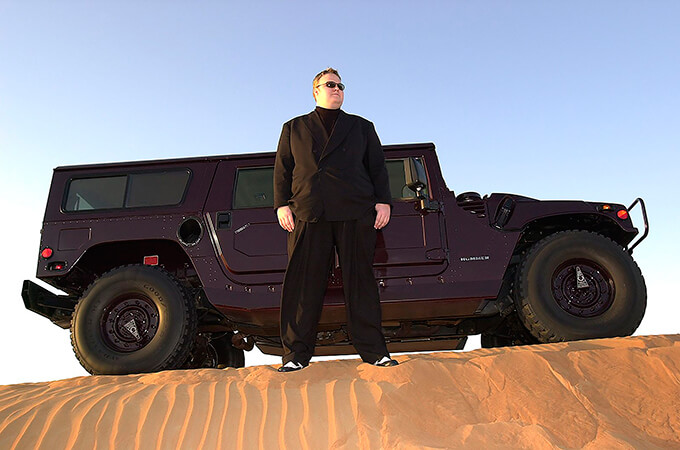
The Internet Mana partnership never made much sense: Dotcom, the internet entrepreneur with right-wing tendencies (certainly when it came to minimising his tax bill), coupled with then-MP Hone Harawira and former Cabinet minister Laila Harré representing the ideals of a progressive left. It all went horribly wrong — no seats, no political power. Harré and Harawira’s reputations were left in tatters, along with those of others who had participated in the farce, notably journalist, broadcaster and former MP Pam Corkery and Scoop Media co-founder Alastair Thompson.
“I just kept turning up at these Internet Mana events and he got to know me a bit,” Goldson says. “Every so often we would have meetings and I would beg for an interview and he would put us off. He was a busy guy.” It ended with Internet Mana’s memorable election-night defeat and Dotcom’s admission: the party would do better when “my brand and my poison is removed”.
Goldson had to commit to doing a film without the interview she desperately wanted. “I had the patience and determination to know we’d probably get an interview in the end.” Dotcom conceded when she was about two-thirds of the way through the film’s edit. There was a similarly long negotiation to buy rights to Dotcom’s extensive personal archive. “It was like a treasure trove — both very intimate home movies, hand-held, evocative, but also very high-end luxury shots: red cameras, drones and helicopters and so forth.”
Goldson’s ideal film would have involved a much more observational view of his daily life. The archive was a stand-in for that kind of intimacy, used to interweave emotional moments throughout the film: meeting Mona for the first time, returning home after being released on bail, being there for the birth of his twins. Suddenly the caricature Dotcom is very real and human. “I think his story is quite Shakespearean in all its ups and downs.” Comedy or tragedy? Undoubtedly both. Goldson’s film asks us to consider the nature of the much-vaunted role of entrepreneur. “Don’t entrepreneurs always work in that grey area? Is Dotcom any different from Ted Turner or the oil barons? Or the founder of Uber? Or Airbnb? Or Bill Gates? Or in fact early Hollywood, which was happy to ‘borrow’ copyrighted stories from Grimm, from Thomas Hardy and others?”
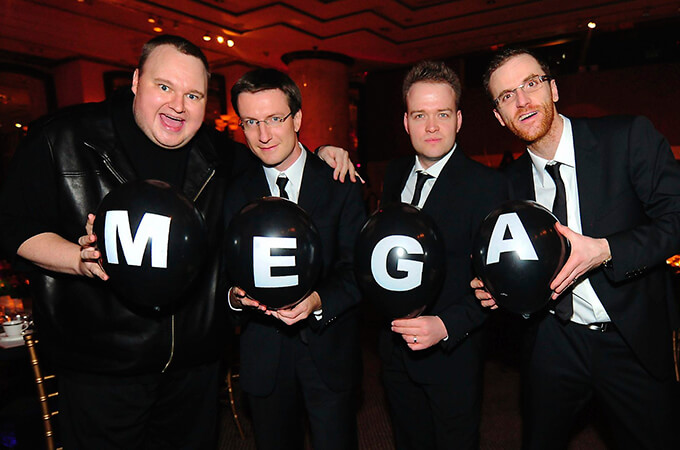
In Goldson’s Shakespearean view, Dotcom’s story is a fight between technological innovation and older models of entrepreneurship. A content copyright war. “If you ask for legal copies, very often the owners are going to set the price ridiculously high because they don’t want competition. If you use it illegitimately, you are sued out of existence. In fact, it’s 80 years in prison.”
Goldson gives a close-up of the battle in a siege-like scene of life in the mansion — Dotcom and others around the dining room table chanting, “They fucked up”, at one of the many missteps by the Crown in the case against him.
She says she was able to build trust with Dotcom because he saw she was engaged with the issues his story brings up. He also knew whatever film was made, it would have to be seen to be independent. “He decided in the end it was better for him to be in the waka than outside it.”
As she does with all her subjects, Goldson let Dotcom see the film when it was in late rough cut, close to locked off. That was partly to fulfil contractual agreements that allowed for fact checking. Her mantra to her subjects: “If there is something you really, really have a problem with, we can talk about it, but I have to retain editorial control.” Did he want changes? “There were a couple of points he wanted emphasising or that he felt needed a rejoinder. I was prepared to consider these requests and felt they did not impact on the editorial line of the film. It is Kim Dotcom’s life, after all.” The sort of change she’s talking about is whether, as reported, Dotcom was holding a sawn-off shotgun during the raid; he wasn’t.
Telling it as it was. “The film is not necessarily pro-Dotcom,” she says. “But on the other hand, neither is it pro-industry or government. I’ve tried to air a series of issues that are critically important to us all and that I believe exceed the Dotcom case.”
I first met Goldson in late 2015 when I worked briefly as a researcher on the project. I’d written about many of the legal machinations of the extradition case and in 2013 had interviewed Dotcom for a feature in Metro. I got a glimpse of Goldson’s meticulous, exhaustive process, how she masses vast amounts of footage and interviews — around 70. “In the documentary process, generally you do shoot wide. We interviewed academics, journalists, musicians and friends and foes of Dotcom. Some addressed copyright issues, others discussed surveillance.” Then some 400 hours of footage is whittled down to an hour and half. “There is not much about the law in there in the end. Fights over file sizes, rewards programmes and the difference between civil and criminal law are not easy to represent or easy for audiences to grasp.” Getting to the essence meant addressing the abuses of process by various bungling New Zealand bureaucracies, which is what led to the string of lawsuits and the delay in the extradition hearing.
Applying the Goldson process of winnowing down masses of material to tell the essentials of her life story yields the following: She was born in Manchester, England, and sailed to New Zealand in the 1960s with her brother and sister on the Dominion Monarch. Her father was a doctor. He was half Jewish, her mother Anglican. “Dad was not really engaging with his Jewishness. We were sent to the Sunday School around the corner.”
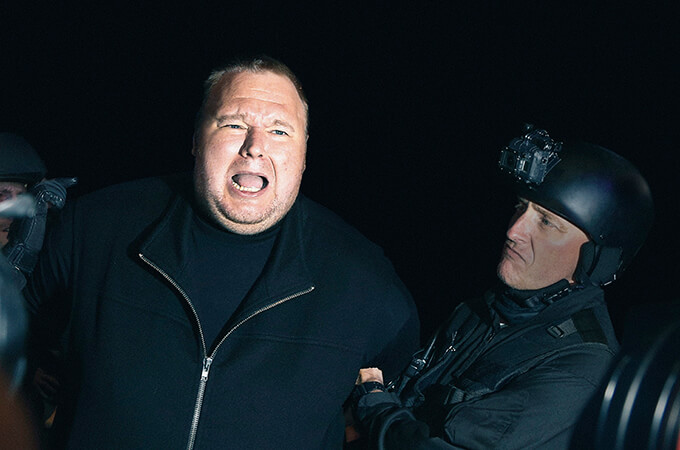
The family lived in Northcote. Goldson went to St Cuthbert’s, then to Westlake Girls. “We had a pretty idyllic upbringing. Our house backed onto the Takapuna municipal golf course off Sunnybrae Rd. We had access to this endless playground.” Her first degree was a BSc from Otago, then a post-graduate diploma in journalism from Canterbury. She worked as a journalist for Radio New Zealand in Wellington. Then she discovered the avant-garde theatre troupe Red Mole and everything changed. “I was infatuated when I first saw Red Mole. I found them funny. They were spectacular. They were insightful. And they were politically engaged.” They were also going to New York. Goldson, who had a boyfriend who was a dancer with the company, hitched a ride. There she began to teach herself film-making, got a green card, finished an MA in film and television studies at New York University in 1986, and taught at the Ivy League Brown University in Rhode Island. “Those years in New York were really influential. It was a highly active time culturally and politically. It was the Reagan years. There was also a lot of community activism and formal experimentation. Those two aspects fused for me. I saw myself more as a video artist through the 1980s, but then I shifted back to my more journalistic roots, to documentary again.”
It was during this time that she made Counterterror, a four-part documentary that examined how the term “terrorism” was used to criminalise political dissent. The project included engaging with groups related to the Black Panthers and activists in Northern Ireland. “A lot of the positive political impulses of the 1960s and 1970s were forced underground by the FBI, in particular through their ‘Cointelpro’ [Counter Intelligence Programme]. I see it as an earlier version of the NSA and Five Eyes,” she says, referring to America’s National Security Agency and the espionage alliance involving New Zealand, Australia, Canada, Britain and the US.
In 1993, she returned to New Zealand to take up an academic role in film studies at Auckland University, and she’s been there ever since. She lives with her long-time partner, Donald Gifford. They have a 22-year-old son, Ben, who works at student radio station bFM. Since she’s been back in New Zealand she’s made 11 documentary films.
The reviews to date of Caught in the Web bear testament to the film’s objectivity. Rolling Stone: “Whether you think he’s a hero or a heel, you’re bound to leave the film with your preconceptions shattered.” EQ Music: “It will make you think and force you to choose which side of internet history you belong on.” Sight & Sound: “She doesn’t judge, but there is certainly more than one villain in her film.”
Even the voice of Hollywood, Variety, recognises Goldson’s film gives Dotcom a fair trial, although its review reads the anti-hero less favourably: “Whether he’s also a sympathetic figure may depend on your feelings about relentlessly self-promoting types willing and able to make hundreds of millions facilitating the theft of other people’s property — i.e. popular movies and music — to realise their delusions of personal grandeur.”
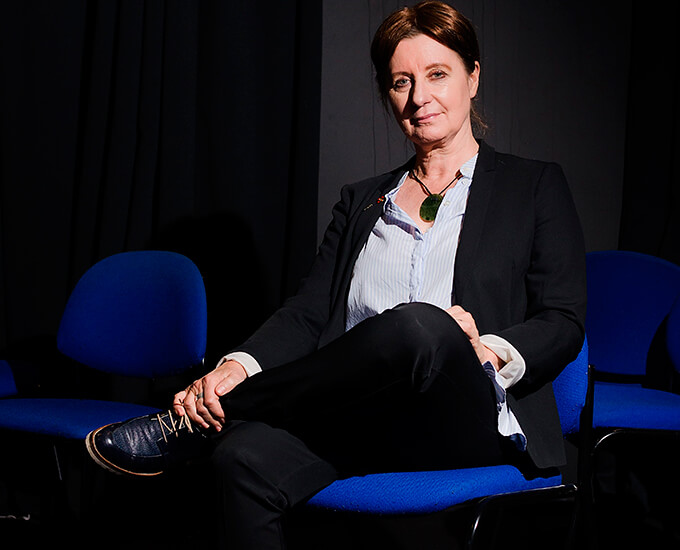
Is Goldson happy with the “objective” label? “It’s funny, I’ve never been a big fan of objectivity. I critique it academically, but I seem to have to return to it in my films sometimes.” She’s talking about how to portray complex issues such as those covered her 2013 film, He Toki Huna: New Zealand in Afghanistan, a forerunner to the Nicky Hager and Jon Stephenson book Hit & Run. “Our point in making the film was: Why did we go there? What did we do there? And why did we hear so little about it?” Goldson is also very critical of mainstream media representation. “New Zealanders would go if John Key was going or if the Minister of Defence was going and they would just film what they were shown,” says Goldson. “They would be taken to girls’ schools and there would be the obligatory stand-up in front of old Soviet tanks. I was pretty critical that Jon Stephenson … was the only person, really funded by bake sales, to go and conduct investigations in our longest war ever.” Did any New Zealand media contact her for background after the controversy over Hit & Run? “No.”
There were similarly multi-layered issues in her 2008 film An Island Calling, about the 2001 murder of John Scott and his partner Greg Scrivener in Suva. “Some of the behaviour by John and Greg and their activities could have been questionable. People feel very strongly about that. But they certainly didn’t deserve to be killed the way they were. So, it was definitely a homophobic murder. Again, I just told it as it was.”
Goldson says she’s not ideologically political. “I’m a kind of lefty feminist type but I’m not really a joiner. Often my work is about politics rather than political itself, but then I do see education as a politicising function.” Feminism? “Feminist as I am, the feminist movement from the 70s did leave people quite burned. There were a lot of divisions within the movement around gender and sexuality, class and race. It was quite dictatorial. I’m very cautious about being told I can’t wear lipstick. My theory is that feminism emerged because women were pissed off with Marxist men for being lazy and arrogant,” she laughs. She doesn’t feel she’s been discriminated against. “There is always everyday sexism that you’re up against. But the university has to be open to the talent it wants to nurture.” The glass ceiling? “I don’t know what’s given me the confidence or resilience because I never really feel that.” She points out that women feature strongly in documentary film making. Something like 49 per cent of the directors at the Hot Docs festival in Canada this year were women. In drama, women directors number only 5-6 per cent. “Why that is the case is an interesting thing to reflect upon. There might not be enough money or fame in documentaries.”
As well as teaching documentary-making, Goldson teaches journalism studies. She’s bothered by the disturbing statistic that 67 per cent of Americans (it’s probably similar here) get their news from Facebook. “That’s got some really profound implications for journalism.” She thinks as journalism declines, documentary has a key role to play. “A lot of the ethos that motivates a critique of culture or a critique of power you find in documentary now. You find those stories that people ignore altogether.” Telling it as it is. “It’s a great time for documentary at the moment. It’s doing pretty well at the box office.”
And yes, she’s still speaking to Kim Dotcom, just. Ever the player, the publicity hound, Dotcom is tweeting the film’s reviews.
This is published in the July- August 2017 issue of Metro.

